Vectors Exam1 and Problem Solutions
1. Find A+B+C.
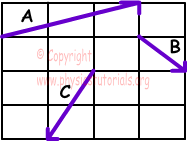 First, we find A+B then add it to vector C.
First, we find A+B then add it to vector C.
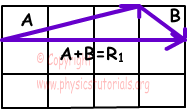 We find R₁, now we add C to R₁ to find resultant vector.
We find R₁, now we add C to R₁ to find resultant vector.
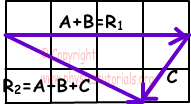 R₂=A+B+C
R₂=A+B+C
2. Find resultant vector.
 Since; A+B=E and C+D=E
Since; A+B=E and C+D=E
R=A+B+C+D+E
R=E+E+E=3E
3. A and A+2B vectors are given below. Find vector B
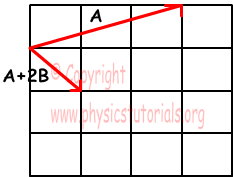 We use vector addition properties.
A+2B-A=2B
We use vector addition properties.
A+2B-A=2B
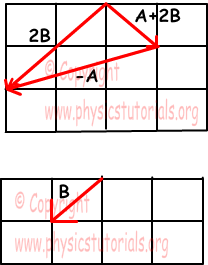 To get vector B, we multiply 2B with 1/2.
To get vector B, we multiply 2B with 1/2.
4. Find resultant vector.
 F₁+F₂=5-2=3N
F₁+F₂=5-2=3N
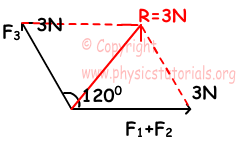 F₁+F₂+F₃=R=3N
F₁+F₂+F₃=R=3N
5. Which one of the following statements is true?
 I. A=B in magnitude
I. A=B in magnitude
II. A=2C
III. E=2D
IV. A=B
As you can see in the figure given above, A and B are equal in magnitude, so I. is true.
If you multiply C with 2, you get A, this means that II. is also true
E =2D in magnitude but not in direction. Thus; III. is false.
A = B in magnitude but they have different directions, thus; IV is also false.
6.
 If α₃<α₂<α₁ and R₁=R₂=R₃, find the relation between F₁, F₂ and F₃.
Decreasing in the angle between forces increases the resultant force.
If α₃<α₂<α₁ and R₁=R₂=R₃, find the relation between F₁, F₂ and F₃.
Decreasing in the angle between forces increases the resultant force.
If α₁=α₂, then R₁>R₂ and F₂>F₃
If α₂=α₃, then R₂>R₃ and F₁>F₂
F₁>F₂>F₃
7. Resultant vector of K, L and M is zero.
 Which one of the following statements given below is definitely false?
Which one of the following statements given below is definitely false?
I. Ky and Ly components are equal vectors
II. K+L=M
III. α=60⁰
 I. Ky=-Ly, they are equal in magnitude but opposite in directions, thus they are not equal vectors.I. is false.
I. Ky=-Ly, they are equal in magnitude but opposite in directions, thus they are not equal vectors.I. is false.
II. Magnitude of K+L=M, but directions are opposite, thus II is also wrong.
III: α=60⁰ is possible. III is not exactly false.